Research Project: Talent Management Impact on HR at Marks & Spencer
VerifiedAdded on 2022/12/29
|17
|4580
|5
Project
AI Summary
This research project evaluates the impact of talent management on human resource management within the UK retail industry, specifically focusing on Marks and Spencer. The study aims to analyze the effects of talent management on HR, addressing research questions related to reward management, performance management, and work-life balance. Objectives include evaluating talent management concepts, studying the role of reward systems, analyzing the impact of performance management, and recommending talent management strategies. The background highlights challenges faced by Marks & Spencer, emphasizing the need for effective talent management strategies. The literature review explores the concept of talent management, reward management, performance management, and work-life balance. The research methodology employs an interpretivism research philosophy to evaluate qualitative data. The project includes a detailed timeline and a Gantt chart outlining the activities and their durations. The study aims to contribute to the understanding of talent management practices and their impact on organizational performance in the retail sector.
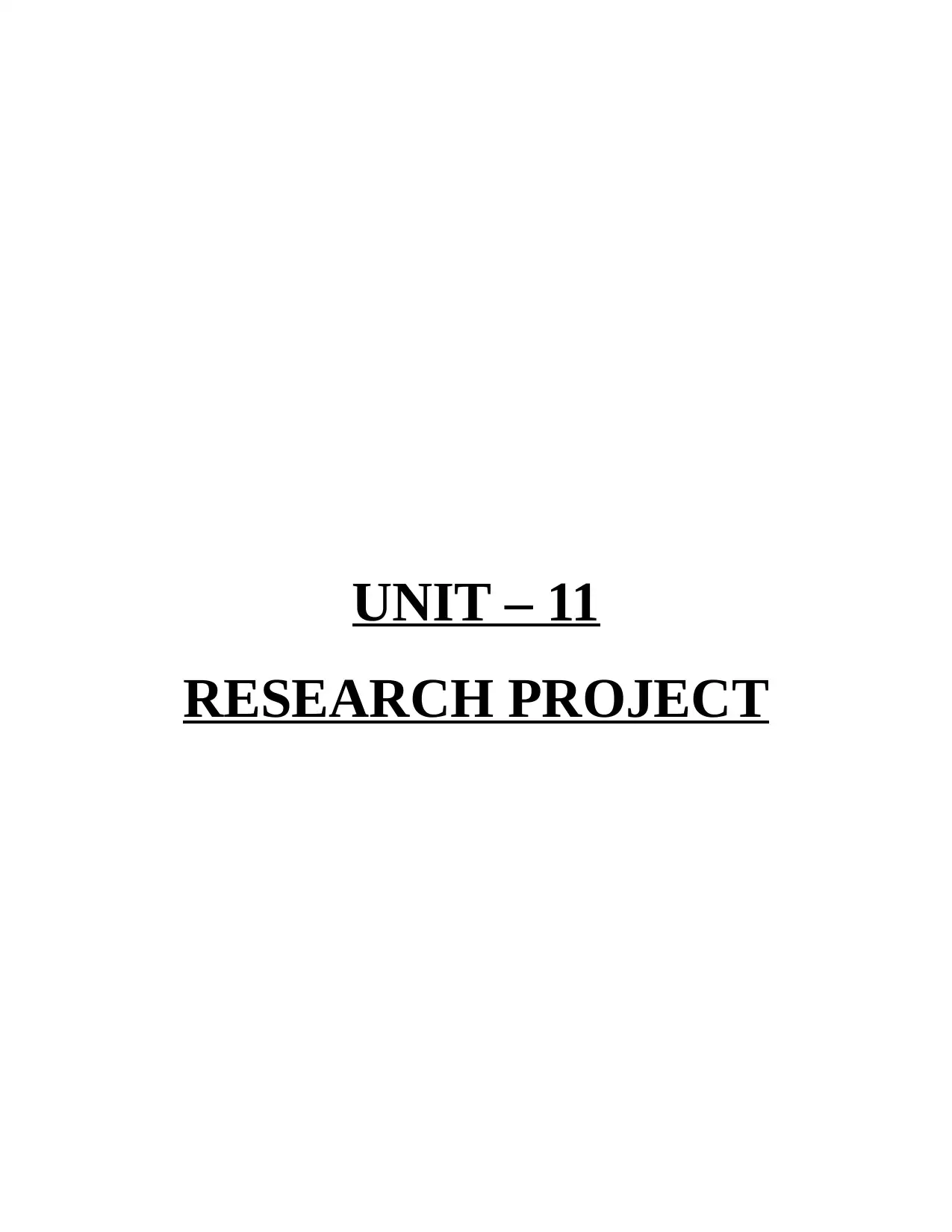
UNIT – 11
RESEARCH PROJECT
RESEARCH PROJECT
Paraphrase This Document
Need a fresh take? Get an instant paraphrase of this document with our AI Paraphraser
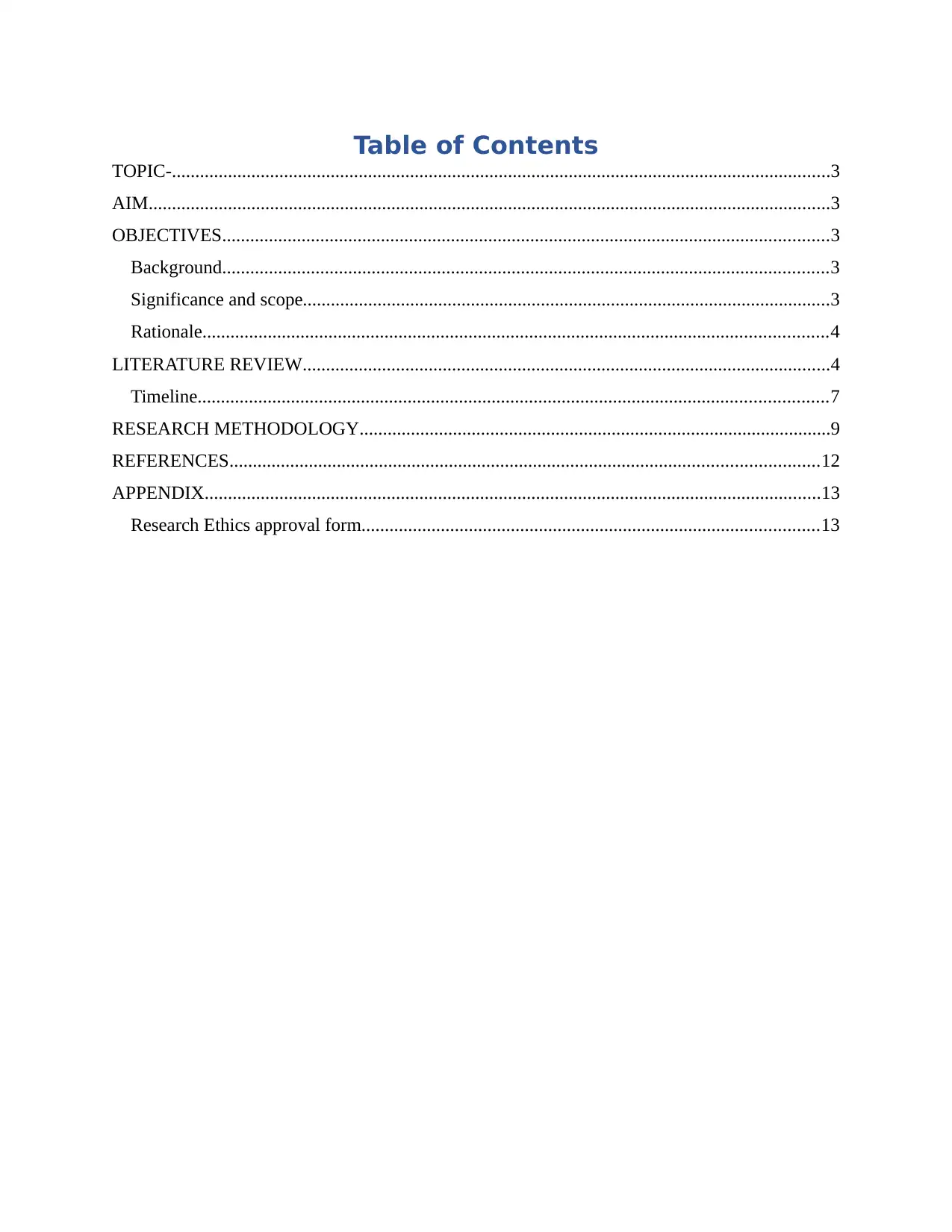
Table of Contents
TOPIC-.............................................................................................................................................3
AIM..................................................................................................................................................3
OBJECTIVES..................................................................................................................................3
Background..................................................................................................................................3
Significance and scope.................................................................................................................3
Rationale......................................................................................................................................4
LITERATURE REVIEW.................................................................................................................4
Timeline.......................................................................................................................................7
RESEARCH METHODOLOGY.....................................................................................................9
REFERENCES..............................................................................................................................12
APPENDIX....................................................................................................................................13
Research Ethics approval form..................................................................................................13
TOPIC-.............................................................................................................................................3
AIM..................................................................................................................................................3
OBJECTIVES..................................................................................................................................3
Background..................................................................................................................................3
Significance and scope.................................................................................................................3
Rationale......................................................................................................................................4
LITERATURE REVIEW.................................................................................................................4
Timeline.......................................................................................................................................7
RESEARCH METHODOLOGY.....................................................................................................9
REFERENCES..............................................................................................................................12
APPENDIX....................................................................................................................................13
Research Ethics approval form..................................................................................................13
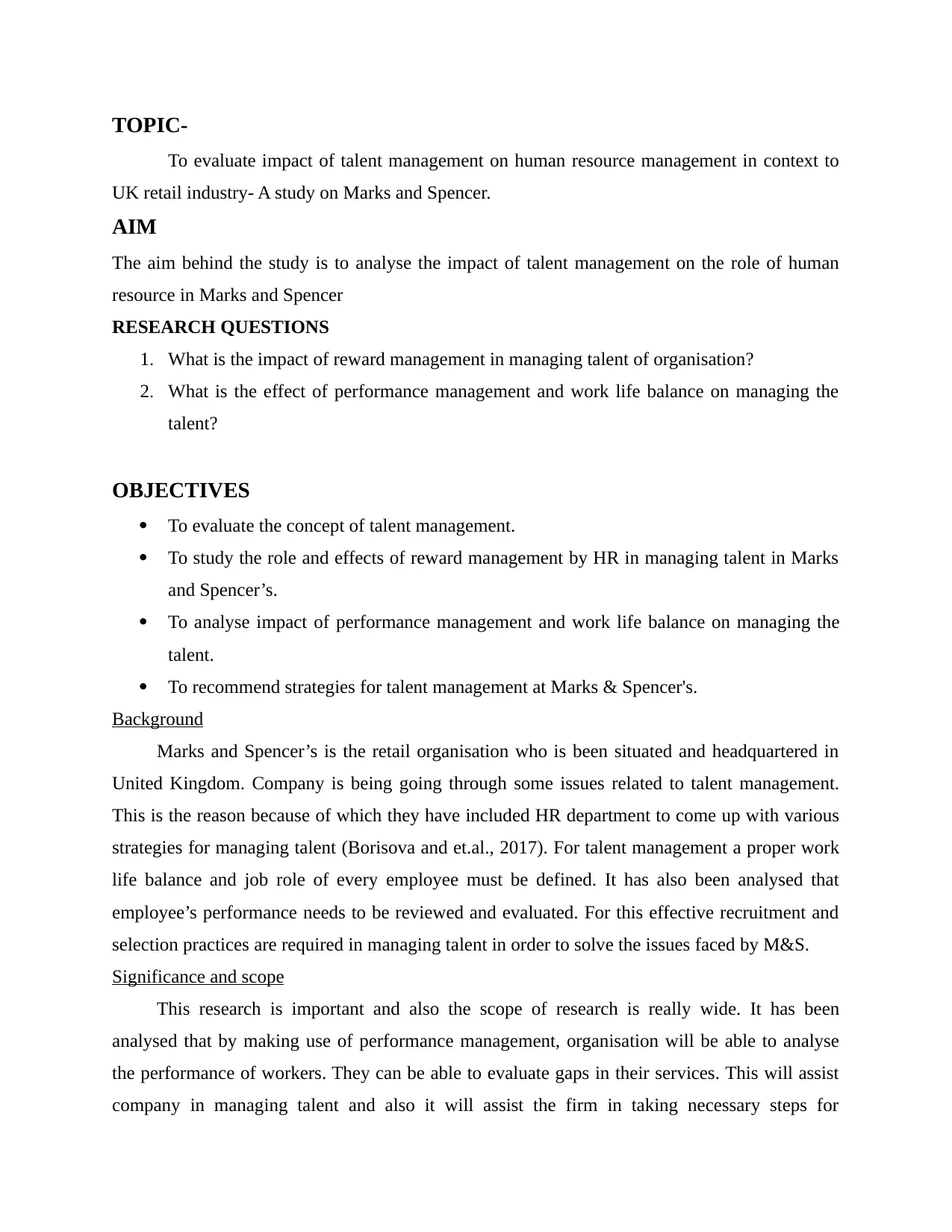
TOPIC-
To evaluate impact of talent management on human resource management in context to
UK retail industry- A study on Marks and Spencer.
AIM
The aim behind the study is to analyse the impact of talent management on the role of human
resource in Marks and Spencer
RESEARCH QUESTIONS
1. What is the impact of reward management in managing talent of organisation?
2. What is the effect of performance management and work life balance on managing the
talent?
OBJECTIVES
To evaluate the concept of talent management.
To study the role and effects of reward management by HR in managing talent in Marks
and Spencer’s.
To analyse impact of performance management and work life balance on managing the
talent.
To recommend strategies for talent management at Marks & Spencer's.
Background
Marks and Spencer’s is the retail organisation who is been situated and headquartered in
United Kingdom. Company is being going through some issues related to talent management.
This is the reason because of which they have included HR department to come up with various
strategies for managing talent (Borisova and et.al., 2017). For talent management a proper work
life balance and job role of every employee must be defined. It has also been analysed that
employee’s performance needs to be reviewed and evaluated. For this effective recruitment and
selection practices are required in managing talent in order to solve the issues faced by M&S.
Significance and scope
This research is important and also the scope of research is really wide. It has been
analysed that by making use of performance management, organisation will be able to analyse
the performance of workers. They can be able to evaluate gaps in their services. This will assist
company in managing talent and also it will assist the firm in taking necessary steps for
To evaluate impact of talent management on human resource management in context to
UK retail industry- A study on Marks and Spencer.
AIM
The aim behind the study is to analyse the impact of talent management on the role of human
resource in Marks and Spencer
RESEARCH QUESTIONS
1. What is the impact of reward management in managing talent of organisation?
2. What is the effect of performance management and work life balance on managing the
talent?
OBJECTIVES
To evaluate the concept of talent management.
To study the role and effects of reward management by HR in managing talent in Marks
and Spencer’s.
To analyse impact of performance management and work life balance on managing the
talent.
To recommend strategies for talent management at Marks & Spencer's.
Background
Marks and Spencer’s is the retail organisation who is been situated and headquartered in
United Kingdom. Company is being going through some issues related to talent management.
This is the reason because of which they have included HR department to come up with various
strategies for managing talent (Borisova and et.al., 2017). For talent management a proper work
life balance and job role of every employee must be defined. It has also been analysed that
employee’s performance needs to be reviewed and evaluated. For this effective recruitment and
selection practices are required in managing talent in order to solve the issues faced by M&S.
Significance and scope
This research is important and also the scope of research is really wide. It has been
analysed that by making use of performance management, organisation will be able to analyse
the performance of workers. They can be able to evaluate gaps in their services. This will assist
company in managing talent and also it will assist the firm in taking necessary steps for
⊘ This is a preview!⊘
Do you want full access?
Subscribe today to unlock all pages.

Trusted by 1+ million students worldwide
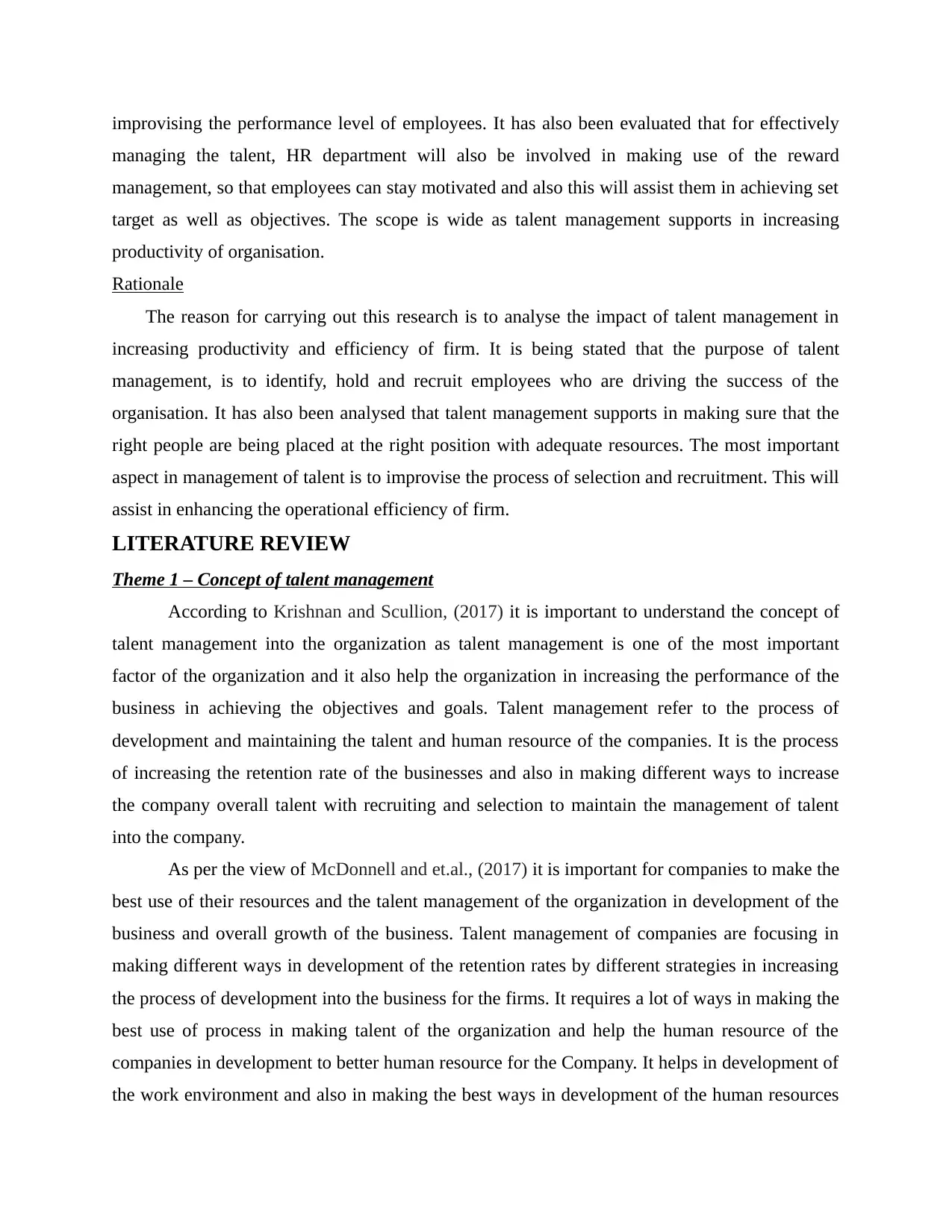
improvising the performance level of employees. It has also been evaluated that for effectively
managing the talent, HR department will also be involved in making use of the reward
management, so that employees can stay motivated and also this will assist them in achieving set
target as well as objectives. The scope is wide as talent management supports in increasing
productivity of organisation.
Rationale
The reason for carrying out this research is to analyse the impact of talent management in
increasing productivity and efficiency of firm. It is being stated that the purpose of talent
management, is to identify, hold and recruit employees who are driving the success of the
organisation. It has also been analysed that talent management supports in making sure that the
right people are being placed at the right position with adequate resources. The most important
aspect in management of talent is to improvise the process of selection and recruitment. This will
assist in enhancing the operational efficiency of firm.
LITERATURE REVIEW
Theme 1 – Concept of talent management
According to Krishnan and Scullion, (2017) it is important to understand the concept of
talent management into the organization as talent management is one of the most important
factor of the organization and it also help the organization in increasing the performance of the
business in achieving the objectives and goals. Talent management refer to the process of
development and maintaining the talent and human resource of the companies. It is the process
of increasing the retention rate of the businesses and also in making different ways to increase
the company overall talent with recruiting and selection to maintain the management of talent
into the company.
As per the view of McDonnell and et.al., (2017) it is important for companies to make the
best use of their resources and the talent management of the organization in development of the
business and overall growth of the business. Talent management of companies are focusing in
making different ways in development of the retention rates by different strategies in increasing
the process of development into the business for the firms. It requires a lot of ways in making the
best use of process in making talent of the organization and help the human resource of the
companies in development to better human resource for the Company. It helps in development of
the work environment and also in making the best ways in development of the human resources
managing the talent, HR department will also be involved in making use of the reward
management, so that employees can stay motivated and also this will assist them in achieving set
target as well as objectives. The scope is wide as talent management supports in increasing
productivity of organisation.
Rationale
The reason for carrying out this research is to analyse the impact of talent management in
increasing productivity and efficiency of firm. It is being stated that the purpose of talent
management, is to identify, hold and recruit employees who are driving the success of the
organisation. It has also been analysed that talent management supports in making sure that the
right people are being placed at the right position with adequate resources. The most important
aspect in management of talent is to improvise the process of selection and recruitment. This will
assist in enhancing the operational efficiency of firm.
LITERATURE REVIEW
Theme 1 – Concept of talent management
According to Krishnan and Scullion, (2017) it is important to understand the concept of
talent management into the organization as talent management is one of the most important
factor of the organization and it also help the organization in increasing the performance of the
business in achieving the objectives and goals. Talent management refer to the process of
development and maintaining the talent and human resource of the companies. It is the process
of increasing the retention rate of the businesses and also in making different ways to increase
the company overall talent with recruiting and selection to maintain the management of talent
into the company.
As per the view of McDonnell and et.al., (2017) it is important for companies to make the
best use of their resources and the talent management of the organization in development of the
business and overall growth of the business. Talent management of companies are focusing in
making different ways in development of the retention rates by different strategies in increasing
the process of development into the business for the firms. It requires a lot of ways in making the
best use of process in making talent of the organization and help the human resource of the
companies in development to better human resource for the Company. It helps in development of
the work environment and also in making the best ways in development of the human resources
Paraphrase This Document
Need a fresh take? Get an instant paraphrase of this document with our AI Paraphraser
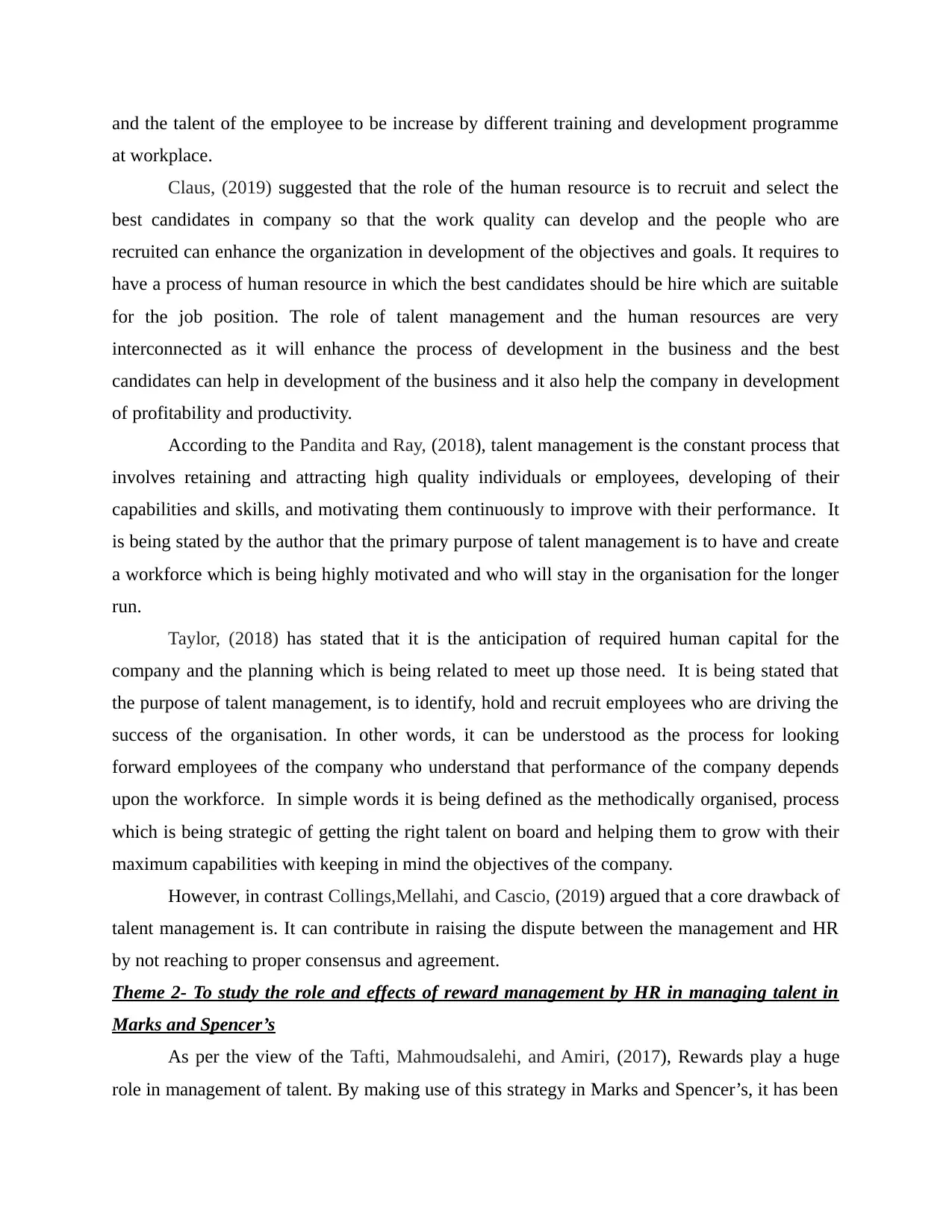
and the talent of the employee to be increase by different training and development programme
at workplace.
Claus, (2019) suggested that the role of the human resource is to recruit and select the
best candidates in company so that the work quality can develop and the people who are
recruited can enhance the organization in development of the objectives and goals. It requires to
have a process of human resource in which the best candidates should be hire which are suitable
for the job position. The role of talent management and the human resources are very
interconnected as it will enhance the process of development in the business and the best
candidates can help in development of the business and it also help the company in development
of profitability and productivity.
According to the Pandita and Ray, (2018), talent management is the constant process that
involves retaining and attracting high quality individuals or employees, developing of their
capabilities and skills, and motivating them continuously to improve with their performance. It
is being stated by the author that the primary purpose of talent management is to have and create
a workforce which is being highly motivated and who will stay in the organisation for the longer
run.
Taylor, (2018) has stated that it is the anticipation of required human capital for the
company and the planning which is being related to meet up those need. It is being stated that
the purpose of talent management, is to identify, hold and recruit employees who are driving the
success of the organisation. In other words, it can be understood as the process for looking
forward employees of the company who understand that performance of the company depends
upon the workforce. In simple words it is being defined as the methodically organised, process
which is being strategic of getting the right talent on board and helping them to grow with their
maximum capabilities with keeping in mind the objectives of the company.
However, in contrast Collings,Mellahi, and Cascio, (2019) argued that a core drawback of
talent management is. It can contribute in raising the dispute between the management and HR
by not reaching to proper consensus and agreement.
Theme 2- To study the role and effects of reward management by HR in managing talent in
Marks and Spencer’s
As per the view of the Tafti, Mahmoudsalehi, and Amiri, (2017), Rewards play a huge
role in management of talent. By making use of this strategy in Marks and Spencer’s, it has been
at workplace.
Claus, (2019) suggested that the role of the human resource is to recruit and select the
best candidates in company so that the work quality can develop and the people who are
recruited can enhance the organization in development of the objectives and goals. It requires to
have a process of human resource in which the best candidates should be hire which are suitable
for the job position. The role of talent management and the human resources are very
interconnected as it will enhance the process of development in the business and the best
candidates can help in development of the business and it also help the company in development
of profitability and productivity.
According to the Pandita and Ray, (2018), talent management is the constant process that
involves retaining and attracting high quality individuals or employees, developing of their
capabilities and skills, and motivating them continuously to improve with their performance. It
is being stated by the author that the primary purpose of talent management is to have and create
a workforce which is being highly motivated and who will stay in the organisation for the longer
run.
Taylor, (2018) has stated that it is the anticipation of required human capital for the
company and the planning which is being related to meet up those need. It is being stated that
the purpose of talent management, is to identify, hold and recruit employees who are driving the
success of the organisation. In other words, it can be understood as the process for looking
forward employees of the company who understand that performance of the company depends
upon the workforce. In simple words it is being defined as the methodically organised, process
which is being strategic of getting the right talent on board and helping them to grow with their
maximum capabilities with keeping in mind the objectives of the company.
However, in contrast Collings,Mellahi, and Cascio, (2019) argued that a core drawback of
talent management is. It can contribute in raising the dispute between the management and HR
by not reaching to proper consensus and agreement.
Theme 2- To study the role and effects of reward management by HR in managing talent in
Marks and Spencer’s
As per the view of the Tafti, Mahmoudsalehi, and Amiri, (2017), Rewards play a huge
role in management of talent. By making use of this strategy in Marks and Spencer’s, it has been
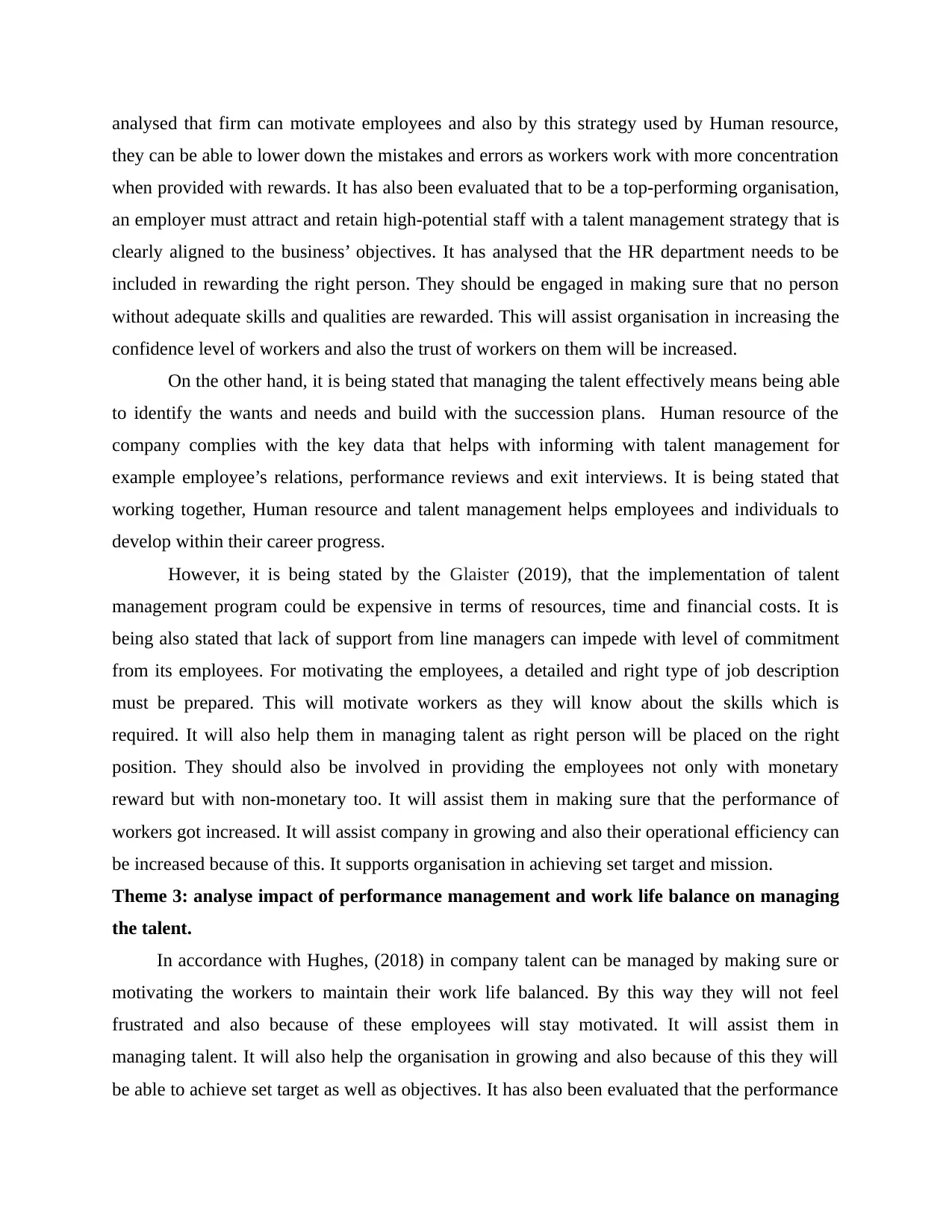
analysed that firm can motivate employees and also by this strategy used by Human resource,
they can be able to lower down the mistakes and errors as workers work with more concentration
when provided with rewards. It has also been evaluated that to be a top-performing organisation,
an employer must attract and retain high-potential staff with a talent management strategy that is
clearly aligned to the business’ objectives. It has analysed that the HR department needs to be
included in rewarding the right person. They should be engaged in making sure that no person
without adequate skills and qualities are rewarded. This will assist organisation in increasing the
confidence level of workers and also the trust of workers on them will be increased.
On the other hand, it is being stated that managing the talent effectively means being able
to identify the wants and needs and build with the succession plans. Human resource of the
company complies with the key data that helps with informing with talent management for
example employee’s relations, performance reviews and exit interviews. It is being stated that
working together, Human resource and talent management helps employees and individuals to
develop within their career progress.
However, it is being stated by the Glaister (2019), that the implementation of talent
management program could be expensive in terms of resources, time and financial costs. It is
being also stated that lack of support from line managers can impede with level of commitment
from its employees. For motivating the employees, a detailed and right type of job description
must be prepared. This will motivate workers as they will know about the skills which is
required. It will also help them in managing talent as right person will be placed on the right
position. They should also be involved in providing the employees not only with monetary
reward but with non-monetary too. It will assist them in making sure that the performance of
workers got increased. It will assist company in growing and also their operational efficiency can
be increased because of this. It supports organisation in achieving set target and mission.
Theme 3: analyse impact of performance management and work life balance on managing
the talent.
In accordance with Hughes, (2018) in company talent can be managed by making sure or
motivating the workers to maintain their work life balanced. By this way they will not feel
frustrated and also because of these employees will stay motivated. It will assist them in
managing talent. It will also help the organisation in growing and also because of this they will
be able to achieve set target as well as objectives. It has also been evaluated that the performance
they can be able to lower down the mistakes and errors as workers work with more concentration
when provided with rewards. It has also been evaluated that to be a top-performing organisation,
an employer must attract and retain high-potential staff with a talent management strategy that is
clearly aligned to the business’ objectives. It has analysed that the HR department needs to be
included in rewarding the right person. They should be engaged in making sure that no person
without adequate skills and qualities are rewarded. This will assist organisation in increasing the
confidence level of workers and also the trust of workers on them will be increased.
On the other hand, it is being stated that managing the talent effectively means being able
to identify the wants and needs and build with the succession plans. Human resource of the
company complies with the key data that helps with informing with talent management for
example employee’s relations, performance reviews and exit interviews. It is being stated that
working together, Human resource and talent management helps employees and individuals to
develop within their career progress.
However, it is being stated by the Glaister (2019), that the implementation of talent
management program could be expensive in terms of resources, time and financial costs. It is
being also stated that lack of support from line managers can impede with level of commitment
from its employees. For motivating the employees, a detailed and right type of job description
must be prepared. This will motivate workers as they will know about the skills which is
required. It will also help them in managing talent as right person will be placed on the right
position. They should also be involved in providing the employees not only with monetary
reward but with non-monetary too. It will assist them in making sure that the performance of
workers got increased. It will assist company in growing and also their operational efficiency can
be increased because of this. It supports organisation in achieving set target and mission.
Theme 3: analyse impact of performance management and work life balance on managing
the talent.
In accordance with Hughes, (2018) in company talent can be managed by making sure or
motivating the workers to maintain their work life balanced. By this way they will not feel
frustrated and also because of these employees will stay motivated. It will assist them in
managing talent. It will also help the organisation in growing and also because of this they will
be able to achieve set target as well as objectives. It has also been evaluated that the performance
⊘ This is a preview!⊘
Do you want full access?
Subscribe today to unlock all pages.

Trusted by 1+ million students worldwide
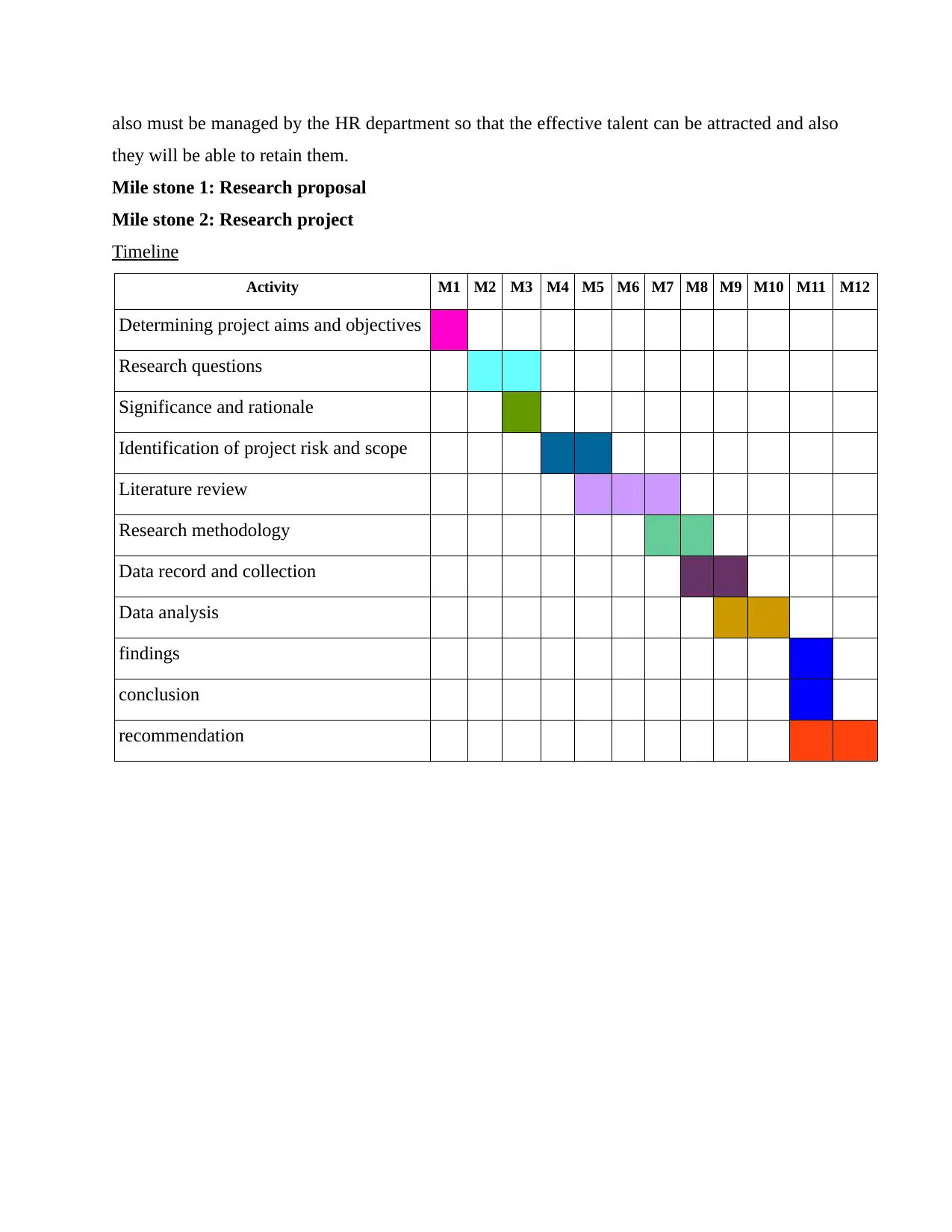
also must be managed by the HR department so that the effective talent can be attracted and also
they will be able to retain them.
Mile stone 1: Research proposal
Mile stone 2: Research project
Timeline
Activity M1 M2 M3 M4 M5 M6 M7 M8 M9 M10 M11 M12
Determining project aims and objectives
Research questions
Significance and rationale
Identification of project risk and scope
Literature review
Research methodology
Data record and collection
Data analysis
findings
conclusion
recommendation
they will be able to retain them.
Mile stone 1: Research proposal
Mile stone 2: Research project
Timeline
Activity M1 M2 M3 M4 M5 M6 M7 M8 M9 M10 M11 M12
Determining project aims and objectives
Research questions
Significance and rationale
Identification of project risk and scope
Literature review
Research methodology
Data record and collection
Data analysis
findings
conclusion
recommendation
Paraphrase This Document
Need a fresh take? Get an instant paraphrase of this document with our AI Paraphraser
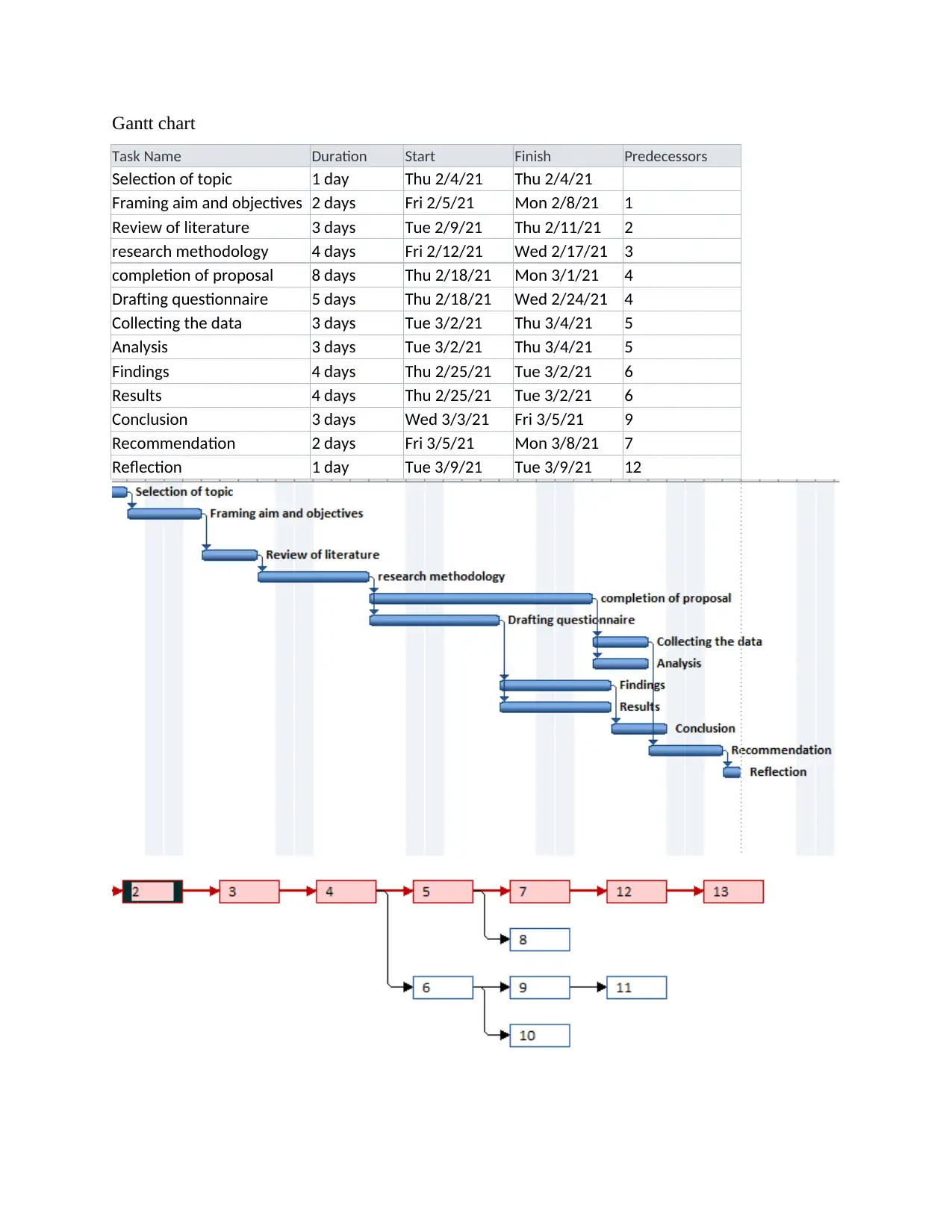
Gantt chart
Task Name Duration Start Finish Predecessors
Selection of topic 1 day Thu 2/4/21 Thu 2/4/21
Framing aim and objectives 2 days Fri 2/5/21 Mon 2/8/21 1
Review of literature 3 days Tue 2/9/21 Thu 2/11/21 2
research methodology 4 days Fri 2/12/21 Wed 2/17/21 3
completion of proposal 8 days Thu 2/18/21 Mon 3/1/21 4
Drafting questionnaire 5 days Thu 2/18/21 Wed 2/24/21 4
Collecting the data 3 days Tue 3/2/21 Thu 3/4/21 5
Analysis 3 days Tue 3/2/21 Thu 3/4/21 5
Findings 4 days Thu 2/25/21 Tue 3/2/21 6
Results 4 days Thu 2/25/21 Tue 3/2/21 6
Conclusion 3 days Wed 3/3/21 Fri 3/5/21 9
Recommendation 2 days Fri 3/5/21 Mon 3/8/21 7
Reflection 1 day Tue 3/9/21 Tue 3/9/21 12
Task Name Duration Start Finish Predecessors
Selection of topic 1 day Thu 2/4/21 Thu 2/4/21
Framing aim and objectives 2 days Fri 2/5/21 Mon 2/8/21 1
Review of literature 3 days Tue 2/9/21 Thu 2/11/21 2
research methodology 4 days Fri 2/12/21 Wed 2/17/21 3
completion of proposal 8 days Thu 2/18/21 Mon 3/1/21 4
Drafting questionnaire 5 days Thu 2/18/21 Wed 2/24/21 4
Collecting the data 3 days Tue 3/2/21 Thu 3/4/21 5
Analysis 3 days Tue 3/2/21 Thu 3/4/21 5
Findings 4 days Thu 2/25/21 Tue 3/2/21 6
Results 4 days Thu 2/25/21 Tue 3/2/21 6
Conclusion 3 days Wed 3/3/21 Fri 3/5/21 9
Recommendation 2 days Fri 3/5/21 Mon 3/8/21 7
Reflection 1 day Tue 3/9/21 Tue 3/9/21 12
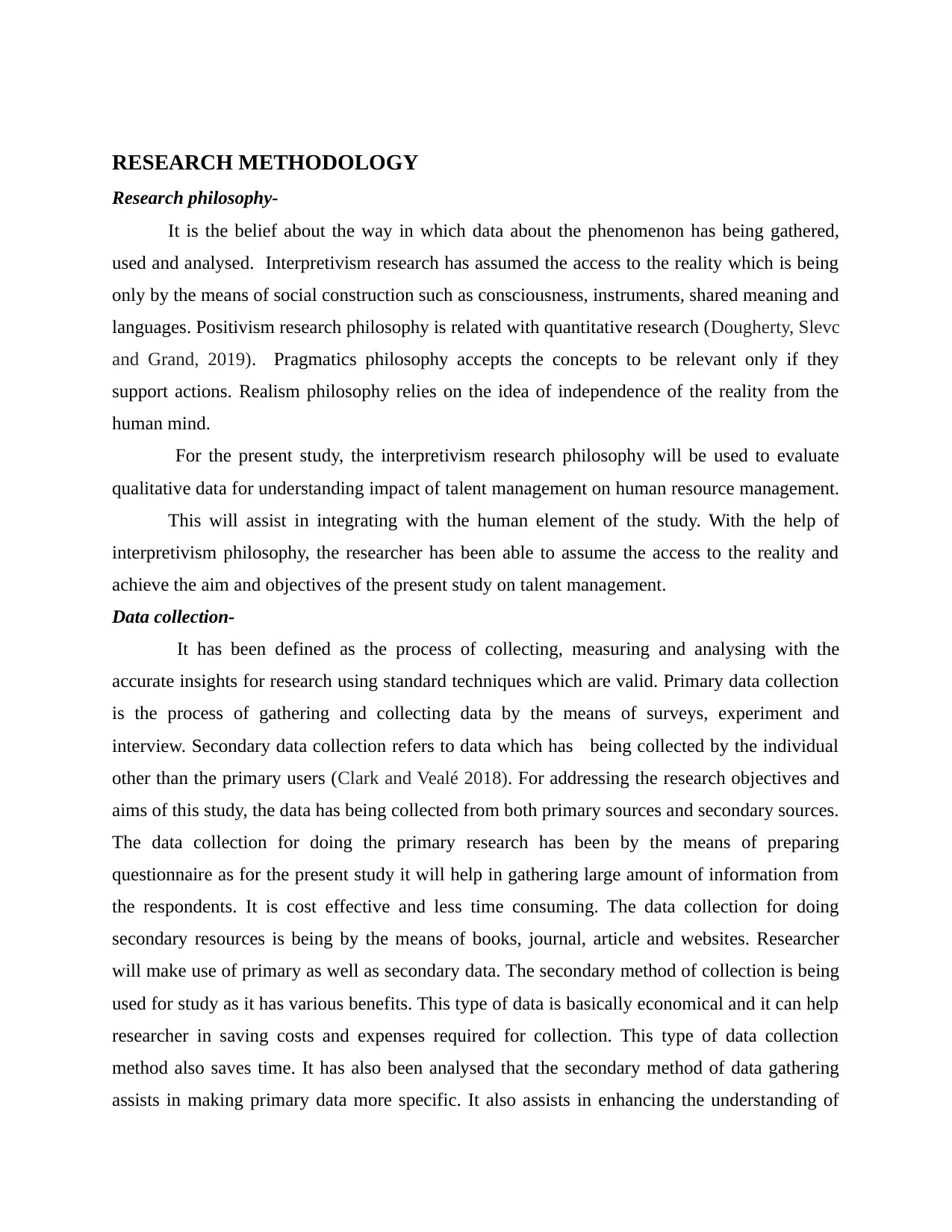
RESEARCH METHODOLOGY
Research philosophy-
It is the belief about the way in which data about the phenomenon has being gathered,
used and analysed. Interpretivism research has assumed the access to the reality which is being
only by the means of social construction such as consciousness, instruments, shared meaning and
languages. Positivism research philosophy is related with quantitative research (Dougherty, Slevc
and Grand, 2019). Pragmatics philosophy accepts the concepts to be relevant only if they
support actions. Realism philosophy relies on the idea of independence of the reality from the
human mind.
For the present study, the interpretivism research philosophy will be used to evaluate
qualitative data for understanding impact of talent management on human resource management.
This will assist in integrating with the human element of the study. With the help of
interpretivism philosophy, the researcher has been able to assume the access to the reality and
achieve the aim and objectives of the present study on talent management.
Data collection-
It has been defined as the process of collecting, measuring and analysing with the
accurate insights for research using standard techniques which are valid. Primary data collection
is the process of gathering and collecting data by the means of surveys, experiment and
interview. Secondary data collection refers to data which has being collected by the individual
other than the primary users (Clark and Vealé 2018). For addressing the research objectives and
aims of this study, the data has being collected from both primary sources and secondary sources.
The data collection for doing the primary research has been by the means of preparing
questionnaire as for the present study it will help in gathering large amount of information from
the respondents. It is cost effective and less time consuming. The data collection for doing
secondary resources is being by the means of books, journal, article and websites. Researcher
will make use of primary as well as secondary data. The secondary method of collection is being
used for study as it has various benefits. This type of data is basically economical and it can help
researcher in saving costs and expenses required for collection. This type of data collection
method also saves time. It has also been analysed that the secondary method of data gathering
assists in making primary data more specific. It also assists in enhancing the understanding of
Research philosophy-
It is the belief about the way in which data about the phenomenon has being gathered,
used and analysed. Interpretivism research has assumed the access to the reality which is being
only by the means of social construction such as consciousness, instruments, shared meaning and
languages. Positivism research philosophy is related with quantitative research (Dougherty, Slevc
and Grand, 2019). Pragmatics philosophy accepts the concepts to be relevant only if they
support actions. Realism philosophy relies on the idea of independence of the reality from the
human mind.
For the present study, the interpretivism research philosophy will be used to evaluate
qualitative data for understanding impact of talent management on human resource management.
This will assist in integrating with the human element of the study. With the help of
interpretivism philosophy, the researcher has been able to assume the access to the reality and
achieve the aim and objectives of the present study on talent management.
Data collection-
It has been defined as the process of collecting, measuring and analysing with the
accurate insights for research using standard techniques which are valid. Primary data collection
is the process of gathering and collecting data by the means of surveys, experiment and
interview. Secondary data collection refers to data which has being collected by the individual
other than the primary users (Clark and Vealé 2018). For addressing the research objectives and
aims of this study, the data has being collected from both primary sources and secondary sources.
The data collection for doing the primary research has been by the means of preparing
questionnaire as for the present study it will help in gathering large amount of information from
the respondents. It is cost effective and less time consuming. The data collection for doing
secondary resources is being by the means of books, journal, article and websites. Researcher
will make use of primary as well as secondary data. The secondary method of collection is being
used for study as it has various benefits. This type of data is basically economical and it can help
researcher in saving costs and expenses required for collection. This type of data collection
method also saves time. It has also been analysed that the secondary method of data gathering
assists in making primary data more specific. It also assists in enhancing the understanding of
⊘ This is a preview!⊘
Do you want full access?
Subscribe today to unlock all pages.

Trusted by 1+ million students worldwide
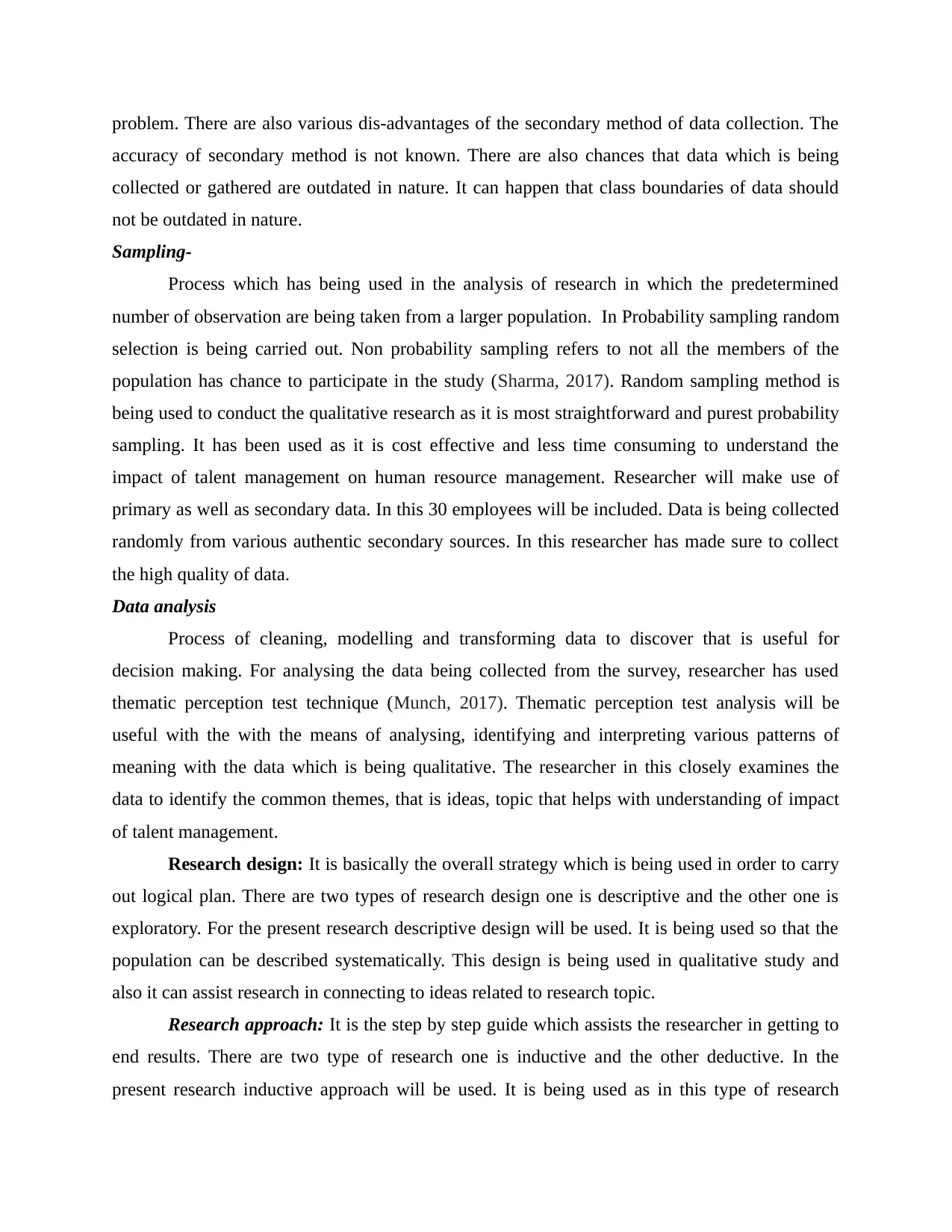
problem. There are also various dis-advantages of the secondary method of data collection. The
accuracy of secondary method is not known. There are also chances that data which is being
collected or gathered are outdated in nature. It can happen that class boundaries of data should
not be outdated in nature.
Sampling-
Process which has being used in the analysis of research in which the predetermined
number of observation are being taken from a larger population. In Probability sampling random
selection is being carried out. Non probability sampling refers to not all the members of the
population has chance to participate in the study (Sharma, 2017). Random sampling method is
being used to conduct the qualitative research as it is most straightforward and purest probability
sampling. It has been used as it is cost effective and less time consuming to understand the
impact of talent management on human resource management. Researcher will make use of
primary as well as secondary data. In this 30 employees will be included. Data is being collected
randomly from various authentic secondary sources. In this researcher has made sure to collect
the high quality of data.
Data analysis
Process of cleaning, modelling and transforming data to discover that is useful for
decision making. For analysing the data being collected from the survey, researcher has used
thematic perception test technique (Munch, 2017). Thematic perception test analysis will be
useful with the with the means of analysing, identifying and interpreting various patterns of
meaning with the data which is being qualitative. The researcher in this closely examines the
data to identify the common themes, that is ideas, topic that helps with understanding of impact
of talent management.
Research design: It is basically the overall strategy which is being used in order to carry
out logical plan. There are two types of research design one is descriptive and the other one is
exploratory. For the present research descriptive design will be used. It is being used so that the
population can be described systematically. This design is being used in qualitative study and
also it can assist research in connecting to ideas related to research topic.
Research approach: It is the step by step guide which assists the researcher in getting to
end results. There are two type of research one is inductive and the other deductive. In the
present research inductive approach will be used. It is being used as in this type of research
accuracy of secondary method is not known. There are also chances that data which is being
collected or gathered are outdated in nature. It can happen that class boundaries of data should
not be outdated in nature.
Sampling-
Process which has being used in the analysis of research in which the predetermined
number of observation are being taken from a larger population. In Probability sampling random
selection is being carried out. Non probability sampling refers to not all the members of the
population has chance to participate in the study (Sharma, 2017). Random sampling method is
being used to conduct the qualitative research as it is most straightforward and purest probability
sampling. It has been used as it is cost effective and less time consuming to understand the
impact of talent management on human resource management. Researcher will make use of
primary as well as secondary data. In this 30 employees will be included. Data is being collected
randomly from various authentic secondary sources. In this researcher has made sure to collect
the high quality of data.
Data analysis
Process of cleaning, modelling and transforming data to discover that is useful for
decision making. For analysing the data being collected from the survey, researcher has used
thematic perception test technique (Munch, 2017). Thematic perception test analysis will be
useful with the with the means of analysing, identifying and interpreting various patterns of
meaning with the data which is being qualitative. The researcher in this closely examines the
data to identify the common themes, that is ideas, topic that helps with understanding of impact
of talent management.
Research design: It is basically the overall strategy which is being used in order to carry
out logical plan. There are two types of research design one is descriptive and the other one is
exploratory. For the present research descriptive design will be used. It is being used so that the
population can be described systematically. This design is being used in qualitative study and
also it can assist research in connecting to ideas related to research topic.
Research approach: It is the step by step guide which assists the researcher in getting to
end results. There are two type of research one is inductive and the other deductive. In the
present research inductive approach will be used. It is being used as in this type of research
Paraphrase This Document
Need a fresh take? Get an instant paraphrase of this document with our AI Paraphraser
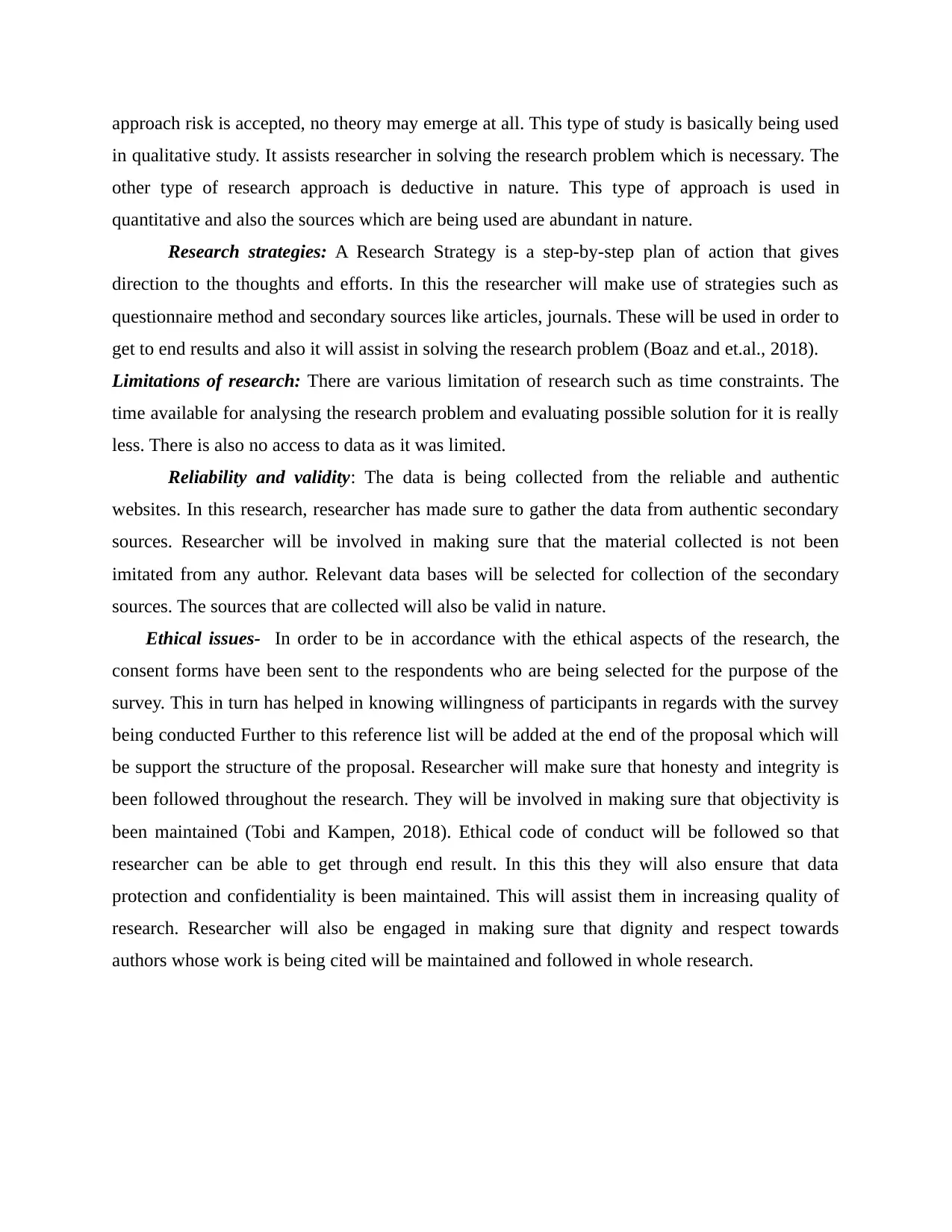
approach risk is accepted, no theory may emerge at all. This type of study is basically being used
in qualitative study. It assists researcher in solving the research problem which is necessary. The
other type of research approach is deductive in nature. This type of approach is used in
quantitative and also the sources which are being used are abundant in nature.
Research strategies: A Research Strategy is a step-by-step plan of action that gives
direction to the thoughts and efforts. In this the researcher will make use of strategies such as
questionnaire method and secondary sources like articles, journals. These will be used in order to
get to end results and also it will assist in solving the research problem (Boaz and et.al., 2018).
Limitations of research: There are various limitation of research such as time constraints. The
time available for analysing the research problem and evaluating possible solution for it is really
less. There is also no access to data as it was limited.
Reliability and validity: The data is being collected from the reliable and authentic
websites. In this research, researcher has made sure to gather the data from authentic secondary
sources. Researcher will be involved in making sure that the material collected is not been
imitated from any author. Relevant data bases will be selected for collection of the secondary
sources. The sources that are collected will also be valid in nature.
Ethical issues- In order to be in accordance with the ethical aspects of the research, the
consent forms have been sent to the respondents who are being selected for the purpose of the
survey. This in turn has helped in knowing willingness of participants in regards with the survey
being conducted Further to this reference list will be added at the end of the proposal which will
be support the structure of the proposal. Researcher will make sure that honesty and integrity is
been followed throughout the research. They will be involved in making sure that objectivity is
been maintained (Tobi and Kampen, 2018). Ethical code of conduct will be followed so that
researcher can be able to get through end result. In this this they will also ensure that data
protection and confidentiality is been maintained. This will assist them in increasing quality of
research. Researcher will also be engaged in making sure that dignity and respect towards
authors whose work is being cited will be maintained and followed in whole research.
in qualitative study. It assists researcher in solving the research problem which is necessary. The
other type of research approach is deductive in nature. This type of approach is used in
quantitative and also the sources which are being used are abundant in nature.
Research strategies: A Research Strategy is a step-by-step plan of action that gives
direction to the thoughts and efforts. In this the researcher will make use of strategies such as
questionnaire method and secondary sources like articles, journals. These will be used in order to
get to end results and also it will assist in solving the research problem (Boaz and et.al., 2018).
Limitations of research: There are various limitation of research such as time constraints. The
time available for analysing the research problem and evaluating possible solution for it is really
less. There is also no access to data as it was limited.
Reliability and validity: The data is being collected from the reliable and authentic
websites. In this research, researcher has made sure to gather the data from authentic secondary
sources. Researcher will be involved in making sure that the material collected is not been
imitated from any author. Relevant data bases will be selected for collection of the secondary
sources. The sources that are collected will also be valid in nature.
Ethical issues- In order to be in accordance with the ethical aspects of the research, the
consent forms have been sent to the respondents who are being selected for the purpose of the
survey. This in turn has helped in knowing willingness of participants in regards with the survey
being conducted Further to this reference list will be added at the end of the proposal which will
be support the structure of the proposal. Researcher will make sure that honesty and integrity is
been followed throughout the research. They will be involved in making sure that objectivity is
been maintained (Tobi and Kampen, 2018). Ethical code of conduct will be followed so that
researcher can be able to get through end result. In this this they will also ensure that data
protection and confidentiality is been maintained. This will assist them in increasing quality of
research. Researcher will also be engaged in making sure that dignity and respect towards
authors whose work is being cited will be maintained and followed in whole research.
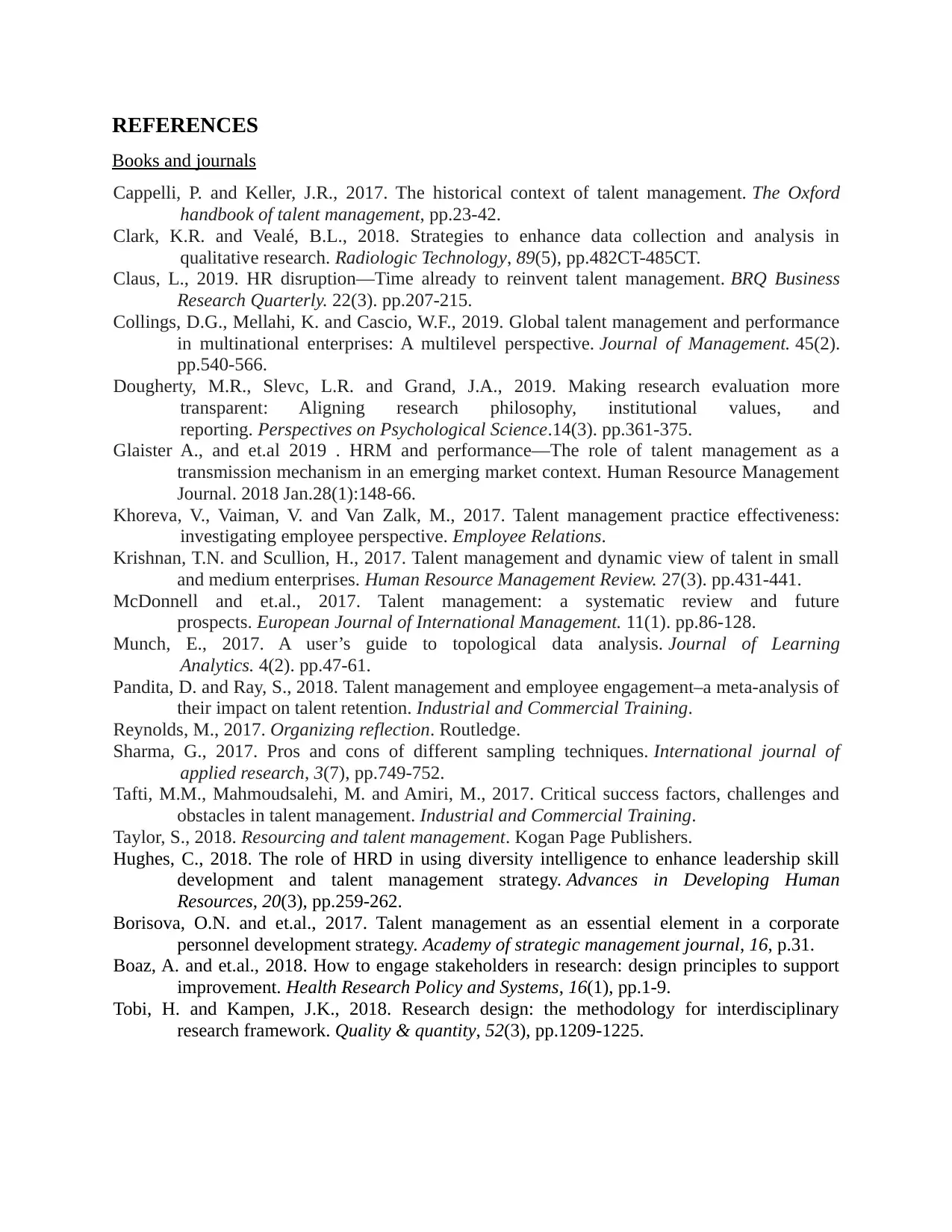
REFERENCES
Books and journals
Cappelli, P. and Keller, J.R., 2017. The historical context of talent management. The Oxford
handbook of talent management, pp.23-42.
Clark, K.R. and Vealé, B.L., 2018. Strategies to enhance data collection and analysis in
qualitative research. Radiologic Technology, 89(5), pp.482CT-485CT.
Claus, L., 2019. HR disruption—Time already to reinvent talent management. BRQ Business
Research Quarterly. 22(3). pp.207-215.
Collings, D.G., Mellahi, K. and Cascio, W.F., 2019. Global talent management and performance
in multinational enterprises: A multilevel perspective. Journal of Management. 45(2).
pp.540-566.
Dougherty, M.R., Slevc, L.R. and Grand, J.A., 2019. Making research evaluation more
transparent: Aligning research philosophy, institutional values, and
reporting. Perspectives on Psychological Science.14(3). pp.361-375.
Glaister A., and et.al 2019 . HRM and performance—The role of talent management as a
transmission mechanism in an emerging market context. Human Resource Management
Journal. 2018 Jan.28(1):148-66.
Khoreva, V., Vaiman, V. and Van Zalk, M., 2017. Talent management practice effectiveness:
investigating employee perspective. Employee Relations.
Krishnan, T.N. and Scullion, H., 2017. Talent management and dynamic view of talent in small
and medium enterprises. Human Resource Management Review. 27(3). pp.431-441.
McDonnell and et.al., 2017. Talent management: a systematic review and future
prospects. European Journal of International Management. 11(1). pp.86-128.
Munch, E., 2017. A user’s guide to topological data analysis. Journal of Learning
Analytics. 4(2). pp.47-61.
Pandita, D. and Ray, S., 2018. Talent management and employee engagement–a meta-analysis of
their impact on talent retention. Industrial and Commercial Training.
Reynolds, M., 2017. Organizing reflection. Routledge.
Sharma, G., 2017. Pros and cons of different sampling techniques. International journal of
applied research, 3(7), pp.749-752.
Tafti, M.M., Mahmoudsalehi, M. and Amiri, M., 2017. Critical success factors, challenges and
obstacles in talent management. Industrial and Commercial Training.
Taylor, S., 2018. Resourcing and talent management. Kogan Page Publishers.
Hughes, C., 2018. The role of HRD in using diversity intelligence to enhance leadership skill
development and talent management strategy. Advances in Developing Human
Resources, 20(3), pp.259-262.
Borisova, O.N. and et.al., 2017. Talent management as an essential element in a corporate
personnel development strategy. Academy of strategic management journal, 16, p.31.
Boaz, A. and et.al., 2018. How to engage stakeholders in research: design principles to support
improvement. Health Research Policy and Systems, 16(1), pp.1-9.
Tobi, H. and Kampen, J.K., 2018. Research design: the methodology for interdisciplinary
research framework. Quality & quantity, 52(3), pp.1209-1225.
Books and journals
Cappelli, P. and Keller, J.R., 2017. The historical context of talent management. The Oxford
handbook of talent management, pp.23-42.
Clark, K.R. and Vealé, B.L., 2018. Strategies to enhance data collection and analysis in
qualitative research. Radiologic Technology, 89(5), pp.482CT-485CT.
Claus, L., 2019. HR disruption—Time already to reinvent talent management. BRQ Business
Research Quarterly. 22(3). pp.207-215.
Collings, D.G., Mellahi, K. and Cascio, W.F., 2019. Global talent management and performance
in multinational enterprises: A multilevel perspective. Journal of Management. 45(2).
pp.540-566.
Dougherty, M.R., Slevc, L.R. and Grand, J.A., 2019. Making research evaluation more
transparent: Aligning research philosophy, institutional values, and
reporting. Perspectives on Psychological Science.14(3). pp.361-375.
Glaister A., and et.al 2019 . HRM and performance—The role of talent management as a
transmission mechanism in an emerging market context. Human Resource Management
Journal. 2018 Jan.28(1):148-66.
Khoreva, V., Vaiman, V. and Van Zalk, M., 2017. Talent management practice effectiveness:
investigating employee perspective. Employee Relations.
Krishnan, T.N. and Scullion, H., 2017. Talent management and dynamic view of talent in small
and medium enterprises. Human Resource Management Review. 27(3). pp.431-441.
McDonnell and et.al., 2017. Talent management: a systematic review and future
prospects. European Journal of International Management. 11(1). pp.86-128.
Munch, E., 2017. A user’s guide to topological data analysis. Journal of Learning
Analytics. 4(2). pp.47-61.
Pandita, D. and Ray, S., 2018. Talent management and employee engagement–a meta-analysis of
their impact on talent retention. Industrial and Commercial Training.
Reynolds, M., 2017. Organizing reflection. Routledge.
Sharma, G., 2017. Pros and cons of different sampling techniques. International journal of
applied research, 3(7), pp.749-752.
Tafti, M.M., Mahmoudsalehi, M. and Amiri, M., 2017. Critical success factors, challenges and
obstacles in talent management. Industrial and Commercial Training.
Taylor, S., 2018. Resourcing and talent management. Kogan Page Publishers.
Hughes, C., 2018. The role of HRD in using diversity intelligence to enhance leadership skill
development and talent management strategy. Advances in Developing Human
Resources, 20(3), pp.259-262.
Borisova, O.N. and et.al., 2017. Talent management as an essential element in a corporate
personnel development strategy. Academy of strategic management journal, 16, p.31.
Boaz, A. and et.al., 2018. How to engage stakeholders in research: design principles to support
improvement. Health Research Policy and Systems, 16(1), pp.1-9.
Tobi, H. and Kampen, J.K., 2018. Research design: the methodology for interdisciplinary
research framework. Quality & quantity, 52(3), pp.1209-1225.
⊘ This is a preview!⊘
Do you want full access?
Subscribe today to unlock all pages.

Trusted by 1+ million students worldwide
1 out of 17
Related Documents
Your All-in-One AI-Powered Toolkit for Academic Success.
+13062052269
info@desklib.com
Available 24*7 on WhatsApp / Email
![[object Object]](/_next/static/media/star-bottom.7253800d.svg)
Unlock your academic potential
Copyright © 2020–2026 A2Z Services. All Rights Reserved. Developed and managed by ZUCOL.




